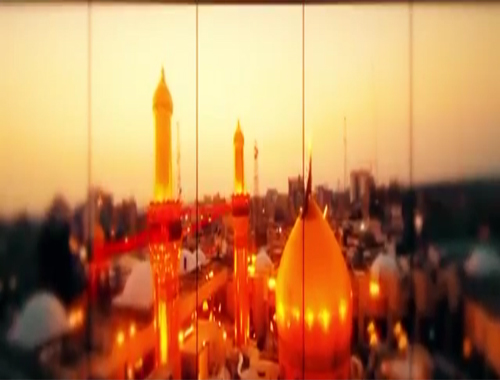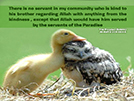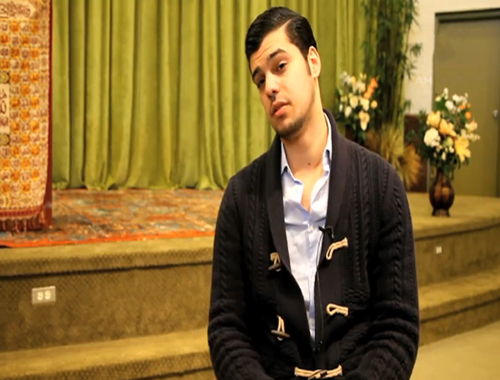Chapter 4 The Third Stage of the Hajj
- Details
- Hits: 2398
Chapter 4 The Third Stage of the Hajj

Third Stage: The third stage is going from Makkah and Madinah back to one's hometown
(سیر من Ù„ØÙ‚ الی الخلق)
The responsibilities at this stage are much more difficult than they were at the first and second level, since it is at this level that one's responsibilities become just like those of the Prophet of Allah:
(الذین یبلّغون رسالات الله)
"Those who convey the messages of Allah. " [40]
In the first and second stage, one was busy with self‑building, but at this stage, one must work on building others. Although the act of enlightening others is dependant upon self‑building, however, this task is so difficult that the Noble Prophet Muhammad (as) has said:
شیّبتّنی سوره هود لمکان قوله: (Ùاستقم کما امرت Ùˆ من تاب معک)
"Surah Hud made my beard white from the point where it was revealed, Continue then in the right way as you are commanded, as also he who has turned (to Allah) with you (O' Muhammad)'." [41]
Self‑building has also been mentioned in Sarah al‑Shuara where it says:
(Ùاستقم کما امرت)
"Continue then in the right way as you are commanded. " [42]
However, that which caused the beard of the Prophet to turn white was the command to build others:
(... و من تاب معک)
"...as also he who has turned towards Allah with you (O' Muhammad). "
After returning from Makkah and Madina, the Hajji must convey that which he has brought with him (his self‑building) to others through his actions. His speech, actions, manner and disposition must be an example for others, and this is truly the best gift that one can bring back for the rest of the people.
The Hajji must inform others of the importance of Salat by performing it right when the time sets in, reciting it in the Masjid, in congregation (Jamaat), and paying attention to the overall importance of it.
Without doubt, that Hajji who is not concerned about the Salat, such that the time for it sets in, but one is absorbed in making a living, has truly not experienced the Hajj. The Qur'an speaks to people like this and curses them by saying: Curse be on you ‑ you are not a Hajji ‑rather, you are not even a Muslim!'
(Ùویل للمصلّین الذین هم عن صلاتهم ساهون)
"So then woe to those who pray ‑ those of them who are heedless of the Saldt. " [43]
Paying attention to all of the acts which are obligatory (Wajib), namely paying Khums and those things which are forbidden such as not taking interest, not taking bribes, not selling less that what one takes money for, not selling things for more than their worth, not to hoard or cheat in business transactions and... are some one the traits that one must bring back from the Hajj as gifts.
One must enliven into the hearts of others things such as paying importance to those acts that are obligatory and staying away from sins.
That Hajji who after returning from Hajj stops paying Khums is not only not regarded as a Hajji, but from the point of the Qur'an, is a polytheist (Mushrik) and a disbeliever (Kafir):
(Ùˆ ویل لّلمشرکین الّذین لایوتون الزکاه Ùˆ هم بالاخره هم کاÙرون)
And woe to the polytheists: those who do not give poor‑rate and do not believe in the hereafter. " [44]
The woman who has just returned from Makkah and Madinah after the Hajj must improve her hijab, and make it the same as the hijab of Fatimah az‑Zahra (as) so that her covering is an example and model not only for herself, but also for others.
That woman who has gone to Makkah but returns without the gift of the hijab of Fatimah az‑Zahra (as) for others and continues to wear her hijdb in a wrong manner, or does not wear the hijab at all, has trampled over more than ten verses of the Qur'an and her Hajj was nothing more than troubles to herself.
Yes! The Muslim man and woman, after completing the Hajj must through his and her Islamic etiquette ‑ both amongst their household and amidst the people ‑ be practical propagators of the faith.
Forgiveness and absolution, dedication and sacrifice should be their mottoes and others must be able to benefit from these maxims, just as the Qur'an has repeatedly mentioned:
(لینÙÙ‚ ذو سعته Ùˆ من قدر علیه رزقه ÙلینÙÙ‚ ممّا آتاه الله)
"Let him who has abundance, spend out of his abundance and whoever has his means of suhsistence straitened to him, let him spend out of that which Allah has given him. " [45]
The Hajji must be an example for others. How difficult this third level truly is, however the rewards are just as great!
(من اØیاها Ùکانّما اØیی النّاس جمیعاً)
And whoever keeps (one person) alive, it is as though he kept alive all of mankind. ' [46]
The one thing that a man and woman who have returned from Hajj must always keep in mind at the third stage is that the Hajjis accountability before Allah , the Ahl al‑Bait (as) and the people is much different than that of the accountability that the common people' have.
For the Hajji, Allah and the Ahl al‑Bait (as) open another book of accounts' in the same way that the common people look at the one who has returned from Hajj in a different light.
Prophet Adam (as), did nothing more than a tark‑e‑Awla (not performing something that was better, rather performing something good' in its place), but since he was one of the chosen' people and this tark-e-?Awla was not appropriate for one with such a holy spirit, thus he was addressed as such:
(اهبطوا بعضکم لبعض عدوّ)
"Get down from here (you two), one of you being an enemy to the other.? [47]
He was expelled from that high status (Jannah) to the lower status (this world).
Even with the status and position that Prophet Yusuf the Truthful (as) held, and with all the high marks that he scored in his tests, still he spent close to ten extra years in prison just for seeking help from other than Allah (swt).
(Ùلبث ÙÛŒ السّجن بضع سنین)
"So then he spent some more years in the prison. " [48]
Prophet Yusuf (as) did not commit a sin, since he was immune from committing sins (masum), but it was this tark‑e‑Awla that he performed which was not befitting for one at his status, and thus he was forced to spend an ten extra years in prison.
There are many more stories like this in the Qur'an that are examples for the men and women who have returned from Hajj.
If a woman who has returned from Hajj ‑ through her actions and the way she carries herself or by not wearing the hijab or not observing it in the proper way, lowers the (value of the) Hajj amongst the people, then her sin is so great, that it is beyond our comprehension whether repentance can absolve her (of her sin) or not.
If a man, through his etiquette and not staying away from sins, especially those which are the Haq al‑Nas meaning those sins which are related to the rights of others, or through not paying proper attention to the Salat, or utter disregard of the Mimbar and Mihrab such that the people consider what he is doing to be permitted, leads the people to think that this Hajji has returned from Allah however (due to his actions) the magnificence of the Hajj is removed from their hearts, then his sin is so great that the Qur'an mentions that it is comparable to murdering all of humanity:
"Whoever slays a soul, unless it be for manslaughter or for mischief in the land, it is as though he slew all men; and whoever keeps it alive, it is as though he kept alive all men. '? [49]
In the completion of our discussion, I would request every man and woman who has been blessed with this great opportunity, and who is now being addressed with the name Hajji' that each and every day you read the above mentioned noble verse of the Qur'an to yourself, and remember the meaning of the verse just as Imam Ja'far as‑Sadiq (as), has taught it.
Make yourself a living example of this noble verse of the Qur'an (the verse quoted above), continuously repeat it, and say to yourself
(من قتل Ù†Ùساً بغیر Ù†Ùس او Ùساد ÙÛŒ الارض Ùکانّما قتل النّاس جمیعاً. Ùˆ من اØیاها Ùکانّما جمیعاً)
I am that person which, from the view point of the Qur'an and the explanation of Imam Jafar as‑Sadiq (as)? that if I give life to one person through my speech, acts or performance in propagation (of the religion), then 1 am like as that person who has saved the entire humanity.
However, if through my speech, actions or the way I carry myself, I cause even one person to be lead astray, and have reduced the (worth of the) Hajj, and reduced the (worth of the) religion in that person's heart, then and I am just like person who has killed all of those in the world.'
I pray to the Maintainer of the Universe for the success of everyone in this spiritual and celestial travel (performing the Hajj in its true essence) under the shadow of the close watch of Imam Wali al‑ Asr, may Allah (SWT) hasten his noble return.
Husain Mazaheri
Notes:
[40] Surah al‑Ahzab (33), Verse 39
[41] Surah Hud (11), Verse 112
[42] Surah al‑Shuara (26), Verse 15
[43] Surah al‑Ma'un (107), Verse 4‑5
[44] Surah al‑Fusilat (41), Verse 6‑7
[45] Surah al‑Talaq (65), Verse 7
[46] Surah al‑Ma'idah (5), Verse 32
[47] Surah al‑Baqarah (2), Verse 36
[48] Surah Yusuf (12), Verse 42
[49] Surah al‑Maidah (5), Verse 32











